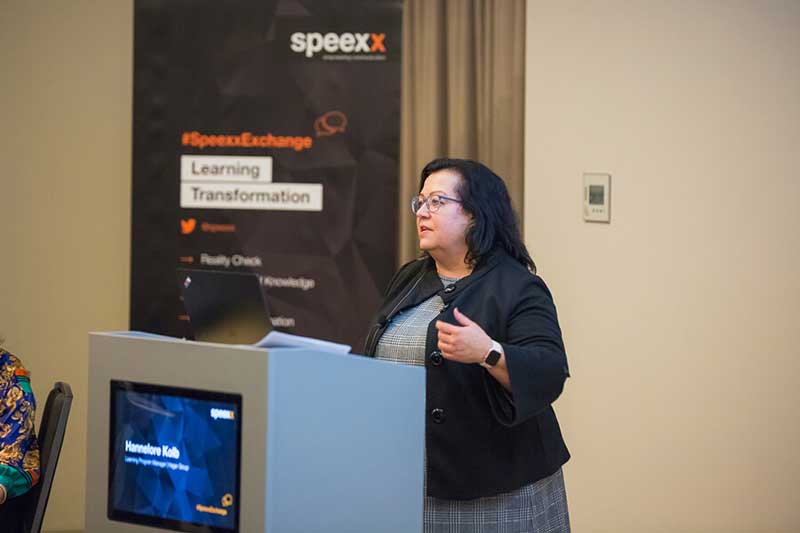Becoming a Global Player Through Digital Transformation
To get a perspective on how an organization can successfully navigate through digital transformation, and to uncover how Hager adopted a culture of learning to transform their organization, we’ve talked to Caroline Fuchs, Training and Development Specialist at Hager Group.
Business crossing borders
In 2016, Hager Group changed the way their regional offices worked with one another. For many years their offices located in France, Germany, China and Poland, were only functioning within their respective territories and were not expected to communicate with one another on a global scale. After changing the business structure of the organization, new processes were implemented, and employees were expected to work and function as an international team.

Level the playing field through a common language
It was determined that a common company language would need to be established, and a language training solution that could be available anytime and anywhere would be necessary to achieve their goal. English would become the common language for Hager Group and all employees working internationally would need to undergo language training. They also found that to function properly as a global organization, they not only needed a common language, but common global processes as well.
‘’All employees located throughout different regions had various levels of English and were previously being assessed according to different global scales, but we knew this needed to change in order to move forward,’’ said Caroline.

Becoming a global player means creating learning with impact
At Speexx Exchange Berlin, Hannelore Kolb, Learning Program Manager of Corporate Talent Management, explained how Hager’s learning transformation took place as the organization expanded internationally. ”In this environment, increasing complexity requires constant learning. For our talent management we decided we would require new organization, skills and competencies,’’ she said. To achieve this, Hager decided to adopt the following:
1. Global mindset and collective intelligence
2. Leadership driving performance, feedback culture and learning culture
3. Tools and platforms, design thinking, constantly aligning to the business
4. Communication and stakeholder management & communities and networks
Becoming a global player means choosing a global solution
Before choosing a new corporate language training solution, Hager Group had various providers across their territories and were using different scales to measure the language levels in each country. ‘’In Europe, language levels are measured according to the CEFR and our offices in China were using something else, and of course this all came with different methods and different pricing. And in other countries we had absolutely no solution – especially in those countries where we had only a small number of employees and there were no providers existing in these regions,’’ explained Caroline.
Hager decided they wanted a global solution which would be available anytime and anywhere. They needed a solution that would work for them in Europe, the Eastern Pacific and the Middle East. ‘’Once it was determined we would go with a global solution, we also had very little experience using digital learning, this would be another challenge for us to overcome,’’ she said.

The challenges of digital transformation
At Hager, Caroline explained that at as they rolled out corporate language training, many employees were hesitant about digital learning for different reasons. Some had no experience with e-learning and others had negative experiences which left them doubtful of the possibility for a good outcome.
Others had security and privacy issues and questioned how their data would be handled – like if their managers could see how often they learned and for how long. They also questioned who could see their data and progress and how it would be managed.
This is understandable, as many corporations have set guidelines for usage of personal devices on the job, or set times when learning should take place. For learning to be successful, organizations need to adapt a culture of learning and allow employees to learn with flexibility.
Preparing to launch
Hager decided to first launch a pilot program with their quality and engineering teams, offering corporate language training to improve communication and workflow. ‘’Before starting, the English levels of the engineering and quality teams were very low. Now the managers are saying that employees are working very well together and connecting through emails, video conferences, and phone calls.
Before the launch of the pilot program, this would not have been the case, as many could not speak English. Speaking and working in English was not in the job profile requirements – in the past, when someone was recruited it was based on their technical competencies and English was never a requirement,’’ Caroline explained.

Growing, developing and learning
Hager’s HR and talent management worked to contribute group transformation by securing the right tools, skillsets and leadership culture within the organization, by doing the following:
1. Identify and attract the right talent where and when it is needed
2. Develop leadership in line with strategy and transformation journey.
3. Define and develop solutions for talent development (toolbox, learning offers)
4. Understand and secure employee engagement and define EVP
Level up with digital language training
Caroline explained that in the past few years since Hager made the move to becoming a global player and functioning as an international team, they have seen much improvement in the communication between teams. Employees started to use the Speexx digital language learning and assessment platform and can improve by two CEFR levels and more per year.
‘’We have seen the levels improve and it is something we can clearly monitor and measure for each user. We have also reduced training costs. Compared to the number of people we have trained, it would have cost us more if we had continued with our face-to-face classes,’’ she said.

Transitioning to digital learning
In 2017 Hager decided to ‘’go digital’’ and started corporate language training with 380 learners and 8 nationalities. In 2019, all 11,500 employees at Hager can access digital learning and the number of learners rose to 1,589 learners and 19 nationalities, with a total of 54,745 hours of training completed so far.
Since Hager made the transition from face-to-face classes to digital learning, Caroline said, ‘’this experience has also helped us to be more open to the digital world and using digital tools, because this was our first real digital learning course and it’s been a good experience and helped us be more open to digital transformation.’’

About Hager Group
Caroline Fuchs is a Learning & Development Specialist for Talent Management at Hager Group. She is in charge of learning programs for France and of language training for Hager.
Hager Group is a leading supplier of solutions and services for electrical installations in residential, commercial and industrial buildings. Their range of solutions and services extends from energy distribution to cable management and from security systems to building automation.
